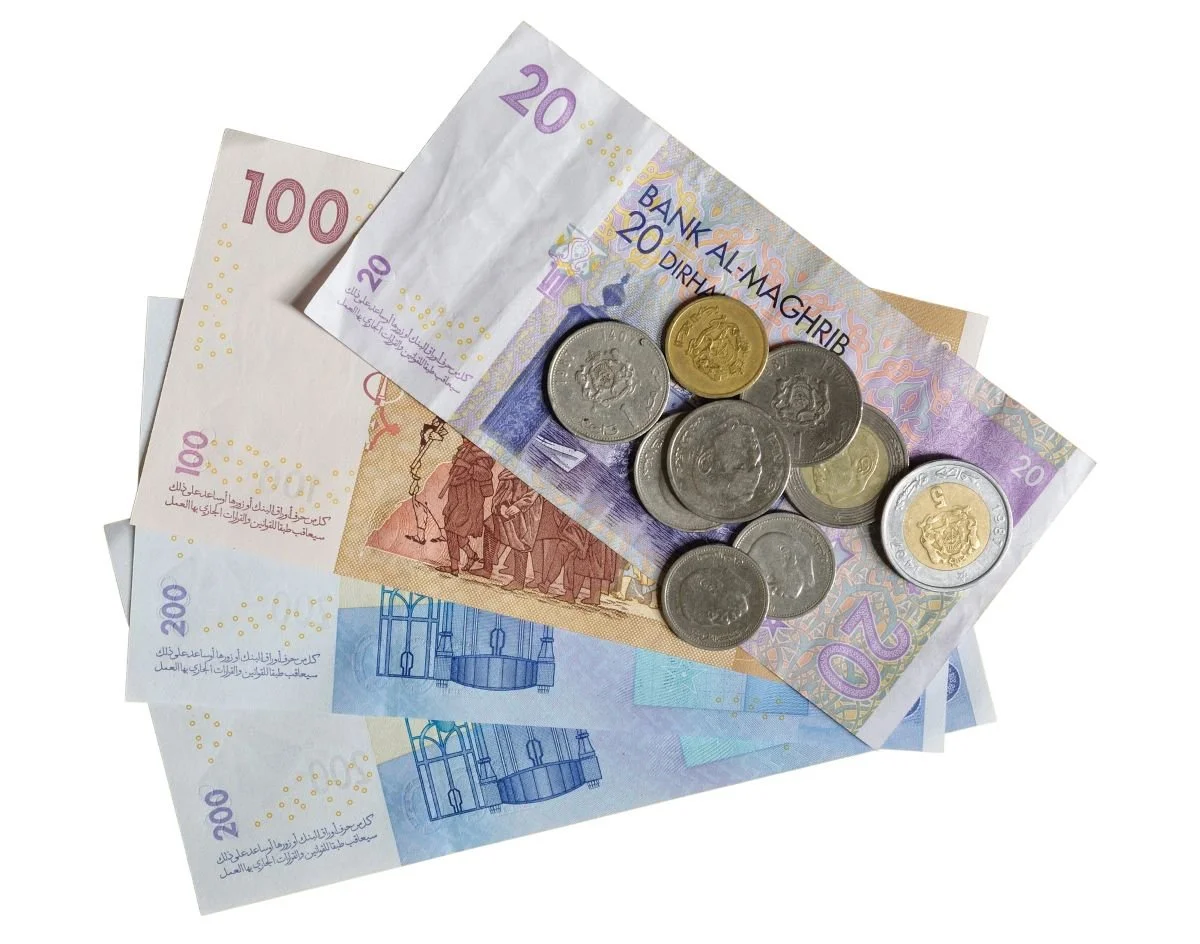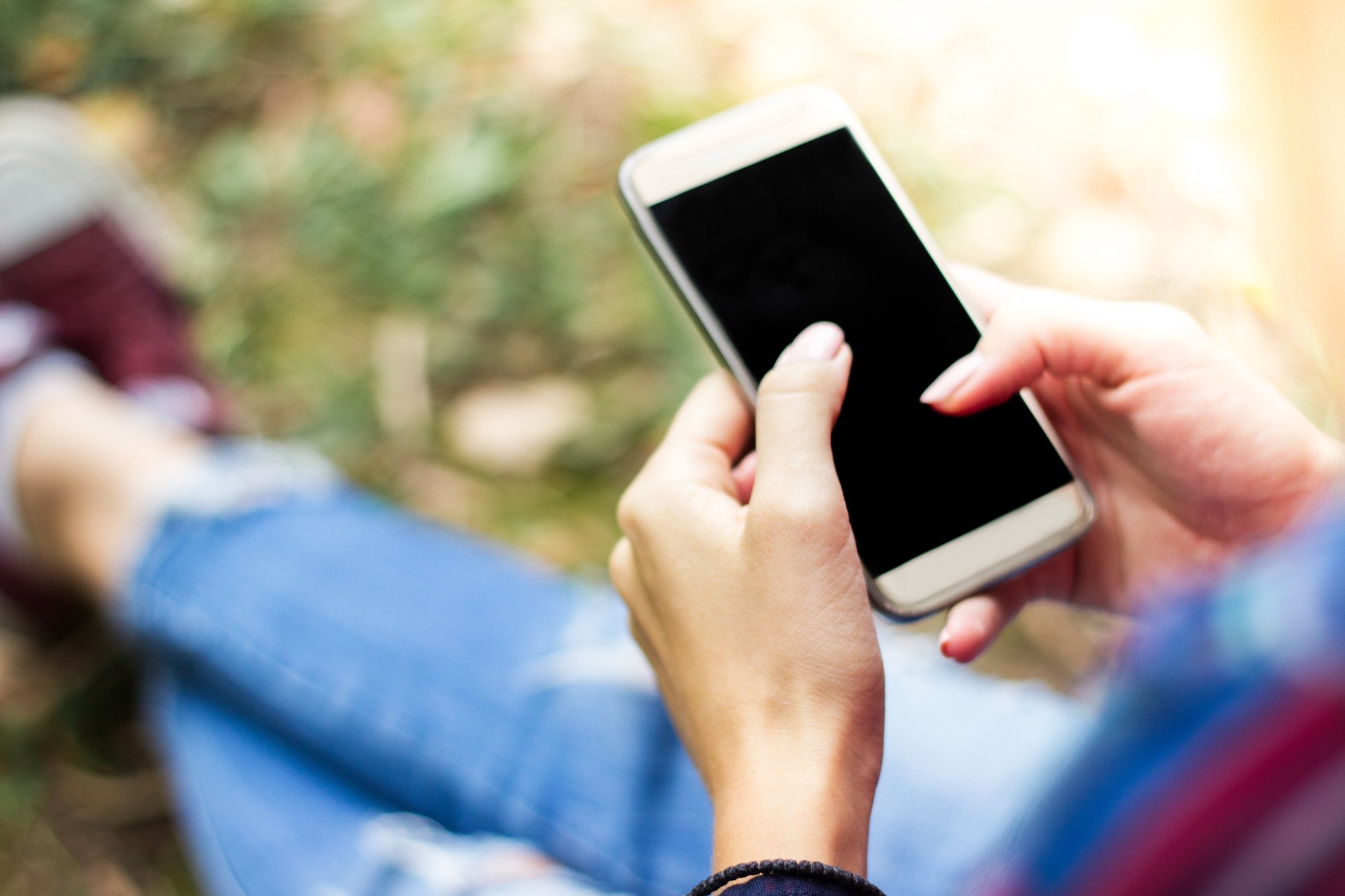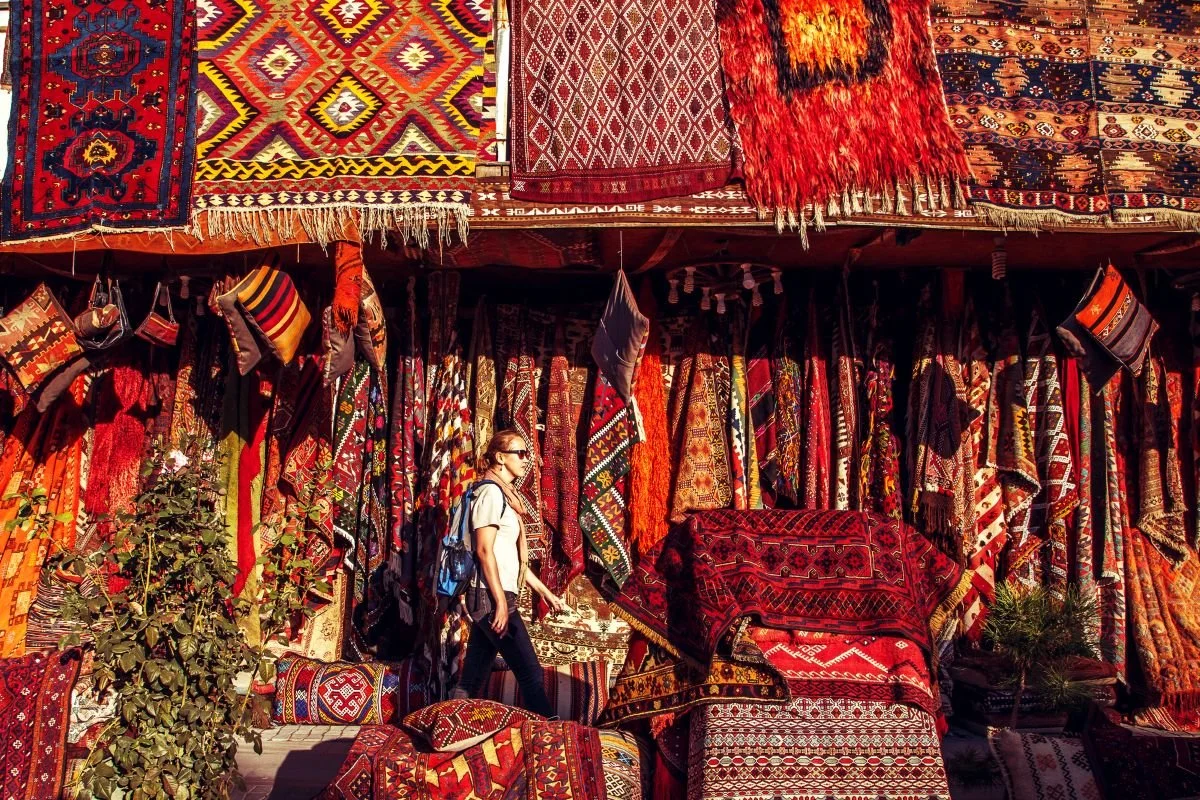MOROCCO
TRAVEL GUIDE
Get to know your destination via our Morocco Travel Guide.
From weather to culture, mobile phones and what to wear, you’ll find it here.
-
Currency
Moroccan Dirham (MAD)
-
Power & Travel Adaptor
220 V
Adaptors C & E
-
Religion
Approx 99% Muslim
1% other
-
Language
Arabic (Modern Standard)
Berber (local language)
-
Tourism 2024
17.4 million visitors
Culture
Moroccan culture is a vibrant tapestry of local Berber, Arab, African, and European influences, deeply rooted in Islamic traditions.
While Morocco is a modernizing nation, it steadfastly preserves its rich cultural heritage and traditions.
Moroccans are renowned for their hospitality, warmth, and strong family values. You can expect to be greeted with genuine kindness and often invited to share mint tea, a significant symbol of Moroccan hospitality. While alcohol is available in tourist areas and some restaurants, it is not widely consumed by the local population.
Etiquette
Respect Islamic Customs: Be mindful of Islamic practices, particularly during the holy month of Ramadan, when many Muslims fast from dawn till dusk.
Dress Conservatively: Especially in rural areas, religious sites, and when visiting homes, it is advisable to dress modestly. This generally means covering shoulders and knees for both men and women.
Public Displays of Affection: Avoid overt public displays of affection.
Photography: Always ask for permission before taking photos of people, especially women & children.
Left Hand: Traditionally, the left hand is considered unclean, so it's polite to eat, pass objects, and shake hands with your right hand.
Weather
Morocco boasts a remarkably diverse climate, influenced by its Atlantic and Mediterranean coastlines, the towering Atlas Mountains, and the vast Sahara Desert. This leads to significant regional variations in weather throughout the year.
Spring (March – May) – Generally mild and pleasant, ideal for exploring, with blooming landscapes, especially in the north. Temperatures typically range from 18∘C to 28∘C (64∘F to 82∘F), but can be cooler in the mountains and hotter towards the desert.
Summer (June – August) – Hot and dry across most of the country. Coastal areas (like Essaouira, Agadir) benefit from Atlantic breezes, with temperatures around 25∘C to 30∘C (77∘F to 86∘F). Inland cities like Marrakech and Fes, and especially the desert regions, experience intense heat, often exceeding 40∘C (104∘F), sometimes even nearing 50∘C (122∘F).
Autumn (September – November) – Warm and comfortable, making it a highly popular time to visit. Temperatures range from 20∘C to 30∘C (68∘F to 86∘F). The heat gradually subsides, offering excellent conditions for both city exploration and desert adventures.
Winter (December – February) – Cool to cold, with significant regional differences. Coastal areas remain mild, around 10∘C to 18∘C (50∘F to 64∘F). Inland cities can be chilly, dropping to 5∘C to 15∘C (41∘F to 59∘F). The Atlas Mountains receive substantial snowfall, and temperatures can fall below 0∘C (32∘F), making them ideal for skiing.
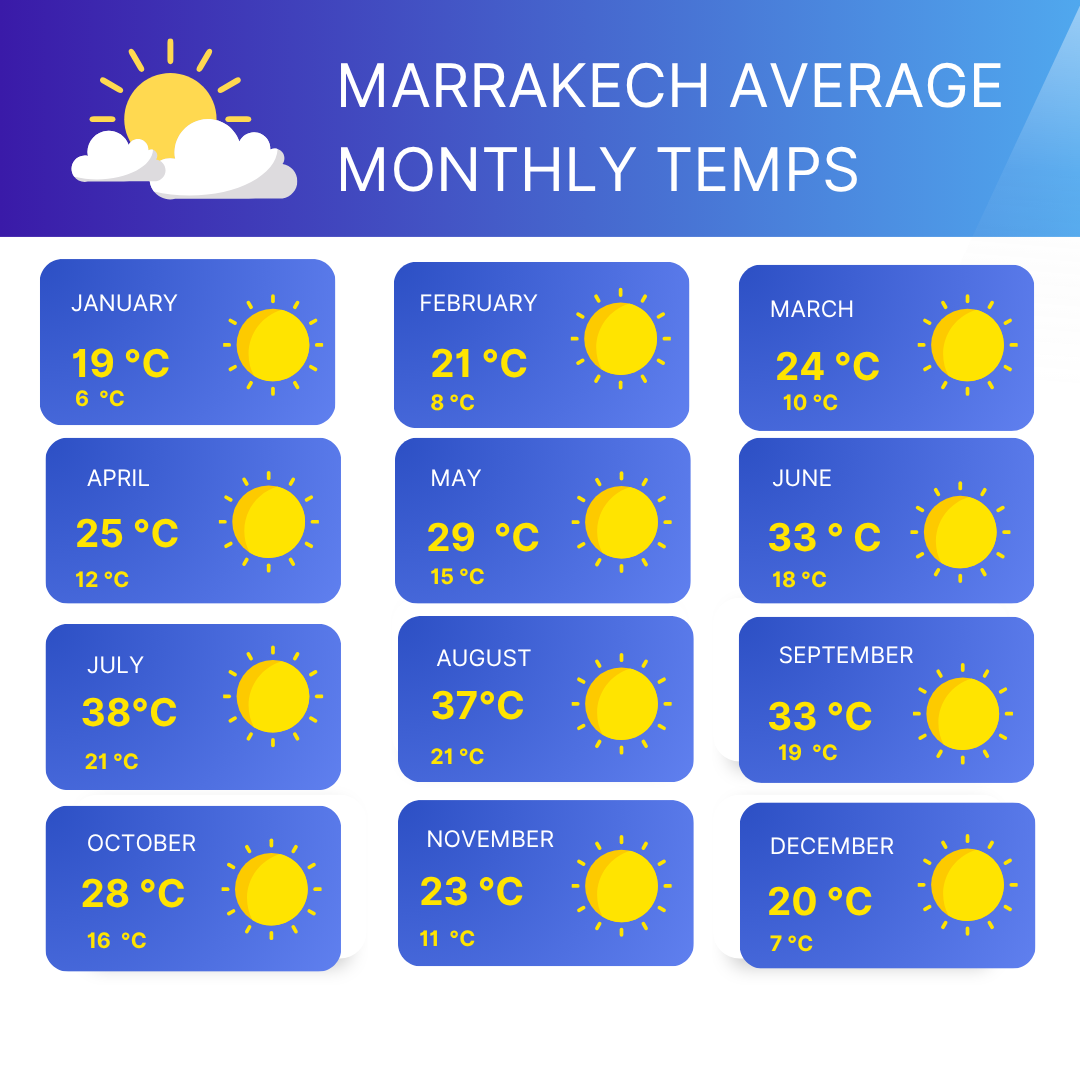
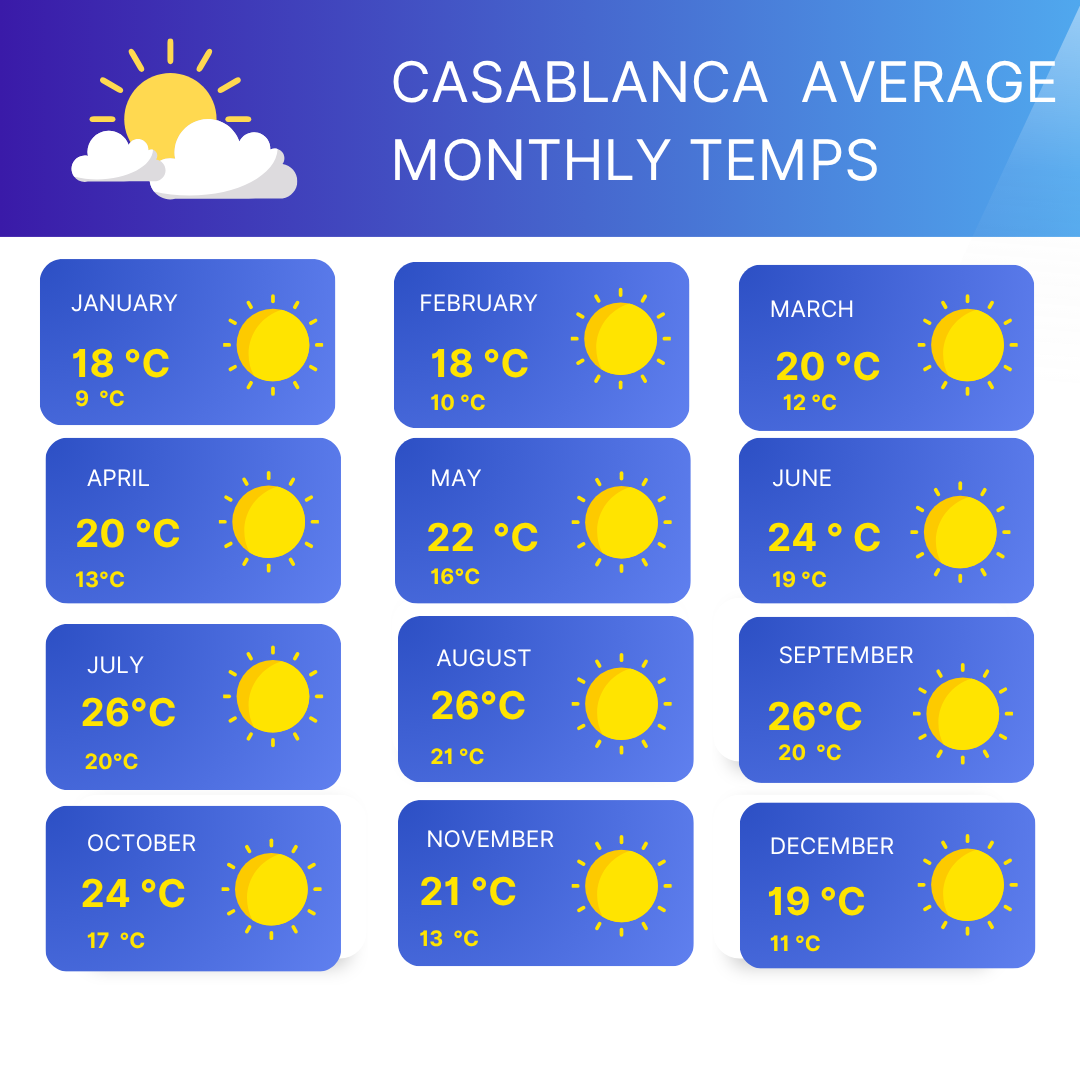
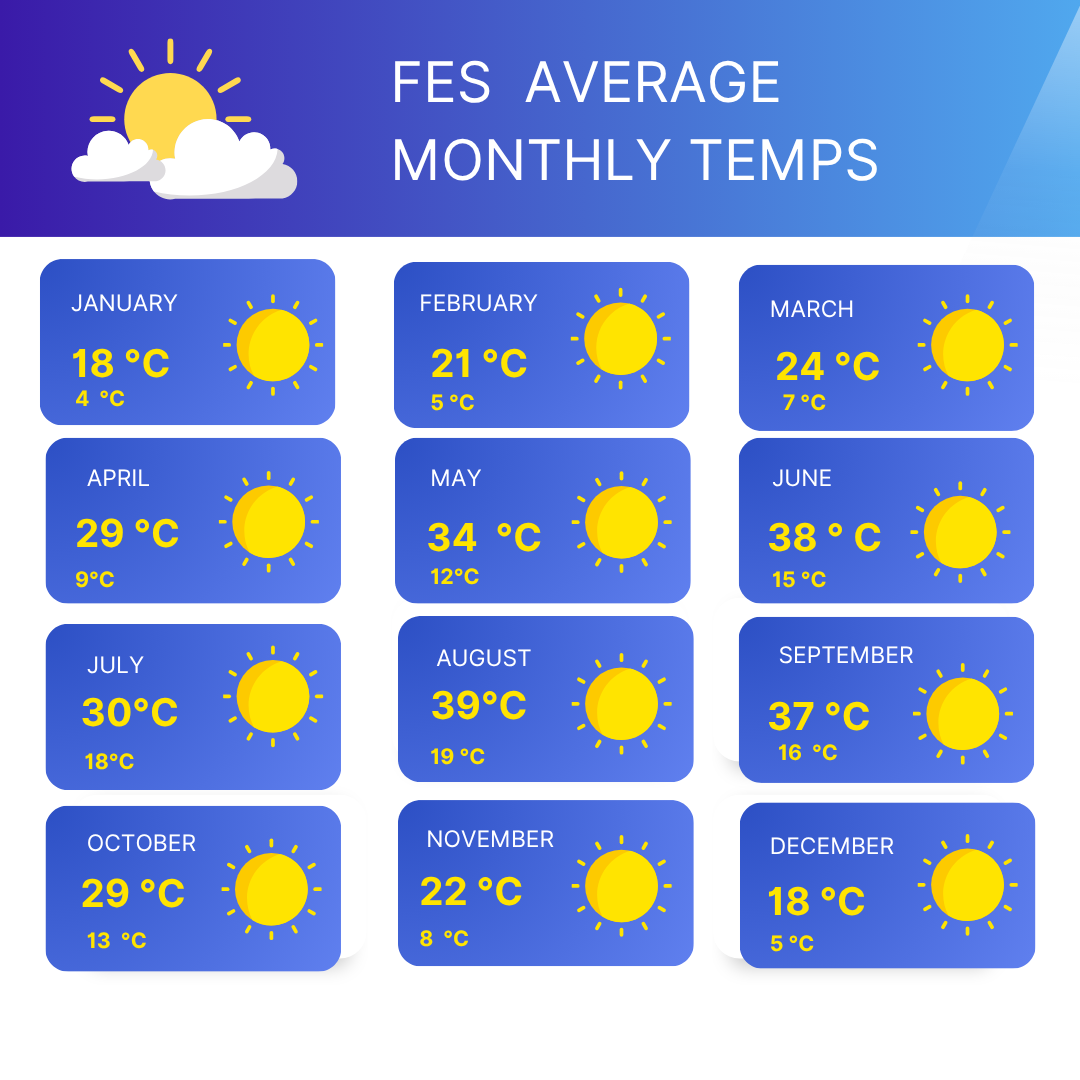

Money
The local currency in Morocco is the Moroccan Dirham (MAD), often abbreviated as DH.
You'll find banknotes in denominations of 20, 50, 100, and 200 DH.
ATMs
ATMs are widely available in cities, major towns, and popular tourist areas, including airports and bank branches. Most accept international debit and credit cards (Visa and Mastercard are the most widely accepted).
Daily withdrawal limits typically range around 2,000 DH ($200 USD equivalent). It's highly recommended to inform your bank of your travel plans to avoid any card issues and to check for potential foreign transaction fees.
Preferred Payment Method
Credit cards are widely accepted in hotels, upscale restaurants, larger shops, and modern establishments in big cities like Marrakech, Casablanca, and Fes. Cash works well for taxis, local markets (souks), small shops, street vendors, and local eateries.
Mobile phones and internet
Morocco's mobile telecommunications infrastructure is well-developed, particularly in urban and tourist areas. Connectivity can become more challenging in very remote areas
The three main mobile phone companies in Morocco are:
Maroc Telecom (IAM): Generally considered to have the widest coverage, especially in more rural and remote regions, including parts of the Sahara.
Orange Morocco: A strong contender, offering excellent coverage and performance in major cities and tourist hotspots.
Inwi: The third major player, known for competitive pricing and good coverage in populated areas.
Many hotels, riads, and guesthouses offer free Wi-Fi for guests. You'll also find free Wi-Fi available in many cafes, restaurants, however, relying solely on free public Wi-Fi throughout your trip might prove challenging or unreliable.
Using apps such as WhatsApp, Viber, and Facebook Messenger for calls and messages is highly recommended as a cost-effective way to stay in touch with home, as these apps utilize data rather than traditional call minutes.
Staying Connected
Local SIM Card: Purchasing a local prepaid SIM card upon arrival is a very common and cost-effective option for tourists. You can buy these at the airport & official mobile operator stores.
eSIM: For those with eSIM-compatible phones, an eSIM is an excellent alternative.
Tipping
Tipping is customary in Morocco and is a token of your appreciation for a service you have been provided.
Tipping is included in all our group tours.
Private and tailor made tours - we provide guests with a tipping guide before their travels.
Tipping can be paid in USD or the local Dirham.
Tour Guide – USD 5 to 10 per person per day OR USD 30+ per day per group
Driver: USD 2 to 3 per person per day OR USD $20+ per group per day
Porters/ Hotels staff 1 to USD per bag
Waiters 10% total bill
Local site guides: USD 5 to 10 per person
Taxi and Uber
Negotiate or check the meter: For petit taxis (city taxis), always agree on the fare before starting or make sure the meter is running.
Grand taxis: Used for longer journeys between towns; fares are usually fixed, but confirm before departure.
Cash is king: Most taxis do not accept cards, so have local dirhams (MAD) ready.
Ride-hailing apps: Uber and Careem operate mainly in Casablanca, Rabat, and Marrakech. Apps allow electronic payment, tracking, and ride requests.
Safety tip: Use official taxis or ride-hailing apps, especially at night, and avoid accepting rides from unlicensed vehicles.
Small change: Keep coins or small notes handy; drivers may not have enough change for large bills.
SHOPPING
Argan Oil & Skincare Products – High-quality oils, lotions, and soaps made from locally produced argan nuts, especially from the Essaouira region.
Handmade Ceramics & Pottery – Colourful plates, bowls, tagines, and decorative tiles, particularly from Fez and Safi.
Traditional Moroccan Clothing – Djellabas, kaftans, babouches (leather slippers), and scarves.
Spices & Sweets – Saffron, cumin, cinnamon, ras el hanout, and Moroccan sweets like chebakia and almond-filled pastries.
Berber Jewelry & Silverware – Distinctive designs featuring silver, enamel, and semi-precious stones.
Leather Goods – Handcrafted bags, belts, wallets, and poufs from the famous tanneries in Fez and Marrakech.
When to haggle
Haggling in Souks, local markets and tourist shop is normal.
Start Low, Expect a Counteroffer – Offer 50-60% of the asking price and negotiate from there.
What to wear
Modesty and Respect: When traveling through Morocco, it is generally best to choose loose, comfortable, and modest clothing to show respect for the local, predominantly Muslim culture, which also helps you blend in and potentially avoid unwanted attention.
For Women: Always cover your shoulders and knees when out in public, opting for items like long flowy dresses, maxi skirts, and loose trousers paired with tops that cover the chest and upper arms. A lightweight scarf or shawl is the single most versatile item, easily used to cover your head (if required) or shoulders when visiting traditional areas or religious sites.
For Men: While slightly more flexible, men should wear knee-length or longer shorts in tourist areas, or choose lightweight long trousers. Lightweight shirts or t-shirts with sleeves. Short sleeves are generally acceptable, but avoid tank tops in rural areas or religious sites
Fabric and Weather: Given the climate, especially the heat inland, prioritize natural, breathable fabrics like cotton and linen. Since temperatures can fluctuate dramatically between day and night, especially in the desert and mountains, layering is the most practical approach to dressing.
Footwear: Bring comfortable footwear for navigating the uneven streets and souks of the medinas and sturdy sneakers for rural trails.
Food - Water - Allergies
Can You Drink the Water?
Drinking tap water in Morocco is not recommended. While tap water is generally treated, it is safer to stick to bottled water for drinking. Tap water is usually safe for bathing, brushing teeth, and washing fruits and vegetables.
Moroccan Cuisine
Moroccan cuisine is a vibrant blend of flavors, influenced by Berber, Arab, and Mediterranean traditions. Meals are often aromatic, with a balance of spices, fresh herbs, and seasonal ingredients.
Tagine is one of Morocco’s most famous dishes. It is a slow-cooked stew made with meat (lamb, chicken, or beef), vegetables, dried fruits, and spices, cooked in a traditional conical clay pot also called a tagine.
Other highlights include couscous, pastilla (savory-sweet pastry with meat and almonds), and a variety of fresh breads and pastries. Moroccan mint tea is a staple drink and a symbol of hospitality.
Food Allergies
Awareness of food different food allergies in Morocco may not be as widespread as in some Western countries.
Many hotels and restaurants can try to accommodate dietary requirements, but you may want to carry some snacks or allergy-safe options as well.
While we inform your accommodation of any food allergies, this messaging may not be received clearly. We recommend always asking and stipulating the requirements you have, and double-check ingredients in dishes.
While with your guide during day tours, they will be able to help you make suitable choices.
Medications &
Vaccinations
It is important for those bringing medication, prescription or not, to keep in original packaging.
It is the responsibility of each traveller to check current vaccination requirements to enter Morocco.
Also note, not all medication available over the counter or by prescription in your home country are available in these countries. Consider bringing enough medication to cover your entire trip. Some medications may even be considered illegal. Please seek advice from your local GP if unsure.
Packing List
Clothing
Light, breathable clothing (linen or cotton are ideal)
Comfortable walking pants or lightweight trousers
Shorts/skirts (knee-length recommended for modesty in some areas)
Warm layers for evenings (fleece or knit jumper – nights can be cool)
Jacket for desert or mountain regions (it can get cold after dark)
Scarf or shawl (useful for sun, wind, modesty in religious sites)
Swimwear (for hotels and hammams)
Comfortable walking shoes
Accessories
Sun hat or cap
Sunglasses
Daypack or small backpack
Toiletries & Personal Items
Sunscreen (high SPF recommended)
Lip balm with SPF
Hand sanitiser
Travel tissues/wet wipes
Moisturiser (air can be dry in desert areas)
Personal medications
Motion sickness tablets (for long drives or winding roads)
Travel Electronics
Phone + charger
Universal power adapter
Portable power bank
Camera + memory cards (optional)



